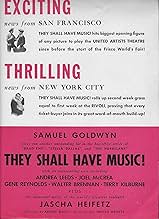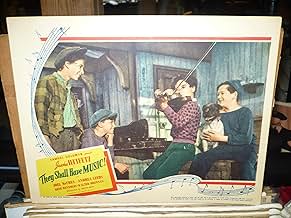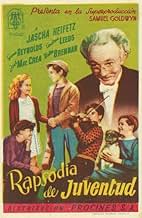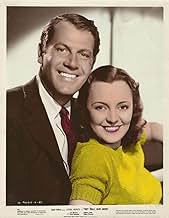CALIFICACIÓN DE IMDb
6.9/10
564
TU CALIFICACIÓN
Un niño se escapa de casa y termina en una escuela de música para niños pobres. Cuando la escuela pasa por momentos difíciles, solicita la ayuda del violinista Heifetz para salvar la situaci... Leer todoUn niño se escapa de casa y termina en una escuela de música para niños pobres. Cuando la escuela pasa por momentos difíciles, solicita la ayuda del violinista Heifetz para salvar la situación.Un niño se escapa de casa y termina en una escuela de música para niños pobres. Cuando la escuela pasa por momentos difíciles, solicita la ayuda del violinista Heifetz para salvar la situación.
- Dirección
- Guionistas
- Elenco
- Nominado a 1 premio Óscar
- 3 premios ganados y 1 nominación en total
Gale Sherwood
- Betty
- (as Jacqueline Nash)
Alexander Schoenberg
- Menken
- (as Alexander Schonberg)
- Dirección
- Guionistas
- Todo el elenco y el equipo
- Producción, taquilla y más en IMDbPro
Opiniones destacadas
I think Samuel Goldwyn was trying to accomplish two things in this film. First the film is a homage to Jascha Heifetz, considered to be the best violin virtuoso of the past century. Secondly having brought to the screen the Dead End kids with his film of the same title and seeing them sign with Warner Brothers, he was trying to create a second gang of appealing urchins.
Though the film was good there certainly was no demand that the kids from this film be reteamed for another feature.
Leader of the gang is Gene Reynolds who at one time played the violin, but now leads a street gang of disreputable urchins. His stepfather, Arthur Hohl, breaks the violin his late father gave young Reynolds and threatens to send him to reform school over the feeble protests of his mother Marjorie Main.
Young Reynolds happens to stumble onto a music school run by the old music maestro himself, Walter Brennan and his daughter Andrea Leeds. They take him in, but they have their financial problems with a lot of creditors led by Porter Hall.
This film is mostly to be seen today because it's a chance for classical music lovers to see and hear Jascha Heifetz who as you gather is the solution one way or another to everybody's problems. Joel McCrea is in this film also, but has a rather colorless part as Andrea Leeds boyfriend.
Besides Heifetz, one thing the film does do is touch on, albeit gingerly on the topic of child abuse and battered spouses. Arthur Hohl is one mean man and Marjorie Main is very clearly a much battered wife.
The kids in the cast do well, Reynolds, Tommy Kelly, Terry Kilburn and a young girl under the name of Jacqueline Nash who grew up and performed as Gale Sherwood, nightclub partner to Nelson Eddy. She had a nice soprano even as a child.
But it's Heifetz you see the show for.
Though the film was good there certainly was no demand that the kids from this film be reteamed for another feature.
Leader of the gang is Gene Reynolds who at one time played the violin, but now leads a street gang of disreputable urchins. His stepfather, Arthur Hohl, breaks the violin his late father gave young Reynolds and threatens to send him to reform school over the feeble protests of his mother Marjorie Main.
Young Reynolds happens to stumble onto a music school run by the old music maestro himself, Walter Brennan and his daughter Andrea Leeds. They take him in, but they have their financial problems with a lot of creditors led by Porter Hall.
This film is mostly to be seen today because it's a chance for classical music lovers to see and hear Jascha Heifetz who as you gather is the solution one way or another to everybody's problems. Joel McCrea is in this film also, but has a rather colorless part as Andrea Leeds boyfriend.
Besides Heifetz, one thing the film does do is touch on, albeit gingerly on the topic of child abuse and battered spouses. Arthur Hohl is one mean man and Marjorie Main is very clearly a much battered wife.
The kids in the cast do well, Reynolds, Tommy Kelly, Terry Kilburn and a young girl under the name of Jacqueline Nash who grew up and performed as Gale Sherwood, nightclub partner to Nelson Eddy. She had a nice soprano even as a child.
But it's Heifetz you see the show for.
You may have heard that music is the universal language. Nowhere is that more true than in Archie Mayo's "They Shall Have Music". It focuses on a troubled boy who runs away from home and joins a struggling music school. Things take a turn when Jascha Heifetz (playing himself) enters the scene.
The movie addresses poverty and funding for the arts. And in the process, we get to hear some masterful performances of works by the great composers (and of course, during the Barber of Seville overture, I pictured Bugs Bunny subjecting Elmer Fudd to all sorts of humiliation to the tune of the overture). No surprise that the children perform the music exquisitely, since Samuel Goldwyn hired the Meremblum Orchestra to star in the movie.
It might not be the greatest movie ever made, but I hope that it reminds people of the importance of the arts. Indeed, during WWII, Winston Churchill got asked if he planned to cut funding for the arts to redirect the money to the armed forces, and he said "Then what are we fighting for?" Alfred Newman's Academy Award-nominated score is like a character by itself. I definitely recommend this movie.
The movie addresses poverty and funding for the arts. And in the process, we get to hear some masterful performances of works by the great composers (and of course, during the Barber of Seville overture, I pictured Bugs Bunny subjecting Elmer Fudd to all sorts of humiliation to the tune of the overture). No surprise that the children perform the music exquisitely, since Samuel Goldwyn hired the Meremblum Orchestra to star in the movie.
It might not be the greatest movie ever made, but I hope that it reminds people of the importance of the arts. Indeed, during WWII, Winston Churchill got asked if he planned to cut funding for the arts to redirect the money to the armed forces, and he said "Then what are we fighting for?" Alfred Newman's Academy Award-nominated score is like a character by itself. I definitely recommend this movie.
Although many audio recordings of great musicians like Jascha Heifetz survive, the cinematic or televised record is limited indeed. This is why musical offerings like "They Shall Have Music" are such rare gems. While, with modern eyes and ears, one can quibble about the plot, the perceptive viewer should put this film's unique delights in their proper perspective. The plot was designed to appeal to both young and old audiences of the era, but it remains enjoyable to this day. A important aspect of the experience of watching classic films is to see them through the eyes of the moviegoer of that era.
I must take issue with reviewer who complains about a film that is in black and white, or who feel obliged to report that their students express such reservations. These are juvenile complaints which reflect a limited historical perspective. For the teacher, this should offer up an educational opportunity to explain the unique qualities of black and white photography and its place in cinematic history. Color can, in fact, get in the way of a good storyline, or the music. For example, the black and white photography of John Ford's "Stagecoach," is, like the still photographs of Ansel Adams, an artistic masterpiece.
As for Heifetz being wooden, I could not disagree more. If you want blatant emotional posturing, go to a rock concert. The role of a classical musician like Heifetz is to move the audience, not him or herself. Heifetz's emotion is conveyed through his playing, not through his body language. He had a rare ability to extract every emotional nuance out of the music and transfer it to his listeners. It is the listener who should be moved, not the artist.
Incidentally, one reviewer asked about seeing Heifetz on YouTube playing the 1st movement of the Tchaikovsky Violin Concerto, with Frank McHugh in the audience. This is from the 1947 film "Carnegie Hall," not "They Shall Have Music" "Carnegie Hall" is an even greater treasure of many great classical artists in their prime. We are blessed that there were film producers who, at least in these limited instances, chose to showcase these artists. In was still an era not totally overwhelmed by the lowest common denominator tripe we get today.
I must take issue with reviewer who complains about a film that is in black and white, or who feel obliged to report that their students express such reservations. These are juvenile complaints which reflect a limited historical perspective. For the teacher, this should offer up an educational opportunity to explain the unique qualities of black and white photography and its place in cinematic history. Color can, in fact, get in the way of a good storyline, or the music. For example, the black and white photography of John Ford's "Stagecoach," is, like the still photographs of Ansel Adams, an artistic masterpiece.
As for Heifetz being wooden, I could not disagree more. If you want blatant emotional posturing, go to a rock concert. The role of a classical musician like Heifetz is to move the audience, not him or herself. Heifetz's emotion is conveyed through his playing, not through his body language. He had a rare ability to extract every emotional nuance out of the music and transfer it to his listeners. It is the listener who should be moved, not the artist.
Incidentally, one reviewer asked about seeing Heifetz on YouTube playing the 1st movement of the Tchaikovsky Violin Concerto, with Frank McHugh in the audience. This is from the 1947 film "Carnegie Hall," not "They Shall Have Music" "Carnegie Hall" is an even greater treasure of many great classical artists in their prime. We are blessed that there were film producers who, at least in these limited instances, chose to showcase these artists. In was still an era not totally overwhelmed by the lowest common denominator tripe we get today.
I really enjoyed this movie, and I'm not a classical music fan. The story of the tough street kid discovering classical music and changing his ways was great to watch, without being sentimental or too unbelievable, although some details had me scratching my head (Frankie and his dog can live in the basement of the school without any of the students or teachers discovering him? Where did he eat? Bathe? Did he ever get a change of clothes? What did he feed his dog? The owner of the school didn't think it was important to notify the police about finding a missing boy, but let him live in the basement indefinitely? :-) ). But we can let such unrealistic details slide and just enjoy the touching, fun, and slightly suspenseful (for me, anyway) story and wonderfully talented children.
I loved the scene with the mothers standing shoulder to shoulder on the steps barring the policemen from entering the school: I doubt they would get away with that nowadays. And I liked the nice touch about the boy Frankie stole from turning the tables on him (although that never really went anywhere), and Frankie's friends helping him out in the end.
All in all, a great movie for everyone!
I loved the scene with the mothers standing shoulder to shoulder on the steps barring the policemen from entering the school: I doubt they would get away with that nowadays. And I liked the nice touch about the boy Frankie stole from turning the tables on him (although that never really went anywhere), and Frankie's friends helping him out in the end.
All in all, a great movie for everyone!
They Shall Have Music from 1939 stars violinist Jascha Heifetz as himself, Joel McCrea, Gene Reynolds, Walter Brennan, Marjorie Main, and a favorite performer of mine, Zero the Dog. Directed by Archie Mayo.
The basic story concerns a boy (Reynolds) who runs away from home and winds up in a music school for kids. Gifted musically, he attempts to help the school stay open by appealing to Heifetz.
The star, of course, is Heifetz' magnificent playing. Though the film states he plays a Stradivarius, that violin name was thought to be more recognizable to audiences than his actual instrument, a Guarnarius. How wonderful to have Heifetz' gorgeous work on film.
If you like opera, you haven't lived until you've heard nine-year-old Gale Sherwood singing Caro Nome. I know hearing a child squeak out the coloratura was a life-changing experience for me.
In fact, Gale Sherwood grew up to be a lovely soprano who made films, did a nightclub act with Nelson Eddy, performed The Desert Song on tv, and Showboat at the LA Music Center. Then she moved to Florida and retired. She can be heard as an adult on YouTube.
I saw Zero the Dog in High Sierra. His role on that film was a tad more dramatic, but he was a delightful thespian and did a great job in this.
The basic story concerns a boy (Reynolds) who runs away from home and winds up in a music school for kids. Gifted musically, he attempts to help the school stay open by appealing to Heifetz.
The star, of course, is Heifetz' magnificent playing. Though the film states he plays a Stradivarius, that violin name was thought to be more recognizable to audiences than his actual instrument, a Guarnarius. How wonderful to have Heifetz' gorgeous work on film.
If you like opera, you haven't lived until you've heard nine-year-old Gale Sherwood singing Caro Nome. I know hearing a child squeak out the coloratura was a life-changing experience for me.
In fact, Gale Sherwood grew up to be a lovely soprano who made films, did a nightclub act with Nelson Eddy, performed The Desert Song on tv, and Showboat at the LA Music Center. Then she moved to Florida and retired. She can be heard as an adult on YouTube.
I saw Zero the Dog in High Sierra. His role on that film was a tad more dramatic, but he was a delightful thespian and did a great job in this.
¿Sabías que…?
- TriviaIn the movie, the newspaper account lists Jascha Heifetz's stolen violin as a Stradivarius. Heifetz used a Guarnarius in the picture and favored that violin in real life, but the producers felt that the name of Stradivarius would be more recognizable.
- ErroresThroughout the picture, the kids in the orchestra are caught looking into the camera or eyeing it sideways, licking their lips, fidgeting, etc.
- Bandas sonorasAndante cantabile
from "String Quartet No.1 in D, Op.11" (1871) (uncredited)
Written by Pyotr Ilyich Tchaikovsky
In the score during the opening credits
Reprised a bit by Gene Reynolds (violin)
Selecciones populares
Inicia sesión para calificar y agrega a la lista de videos para obtener recomendaciones personalizadas
- How long is They Shall Have Music?Con tecnología de Alexa
Detalles
- Tiempo de ejecución1 hora 42 minutos
- Color
- Relación de aspecto
- 1.37 : 1
Contribuir a esta página
Sugiere una edición o agrega el contenido que falta
























